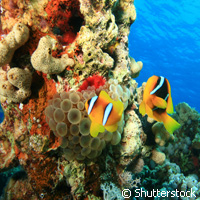Ocean acidification makes clownfish hard of hearing
For baby clownfish, hearing is one of the most important components of their armoury for ocean survival - they use their ability to hear to detect and avoid predator-rich coral reefs during the daytime. But new research from an international team of researchers shows that this crucial sense could be under threat from the effects of ocean acidification. The team, from Australia, Taiwan and the United Kingdom, build on previous work in the field showing how fish can lose their sense of smell as a result of ocean acidification. These new findings, published in the journal Biology Letters, show that now hearing is also an area for concern. The phenomenon of ocean acidification has been around since fossil fuels were first burnt on a large scale. Over half of all the CO2 produced by burning fossil fuels is absorbed by the ocean, which makes pH drop. Since the onset of the Industrial Revolution, pH levels in the ocean have fallen faster than at any other point in the last 650,000 years. The team made these findings after analysing larvae reared straight from hatching in different CO2 environments. After 17 to 20 days, the scientists monitored how the clownfish responded to various sounds that come from a predator-rich coral reef, such as the sound of crustaceans and fish. Lead author Dr Steve Simpson from the University of Bristol explains: 'We kept some of the baby clownfish in today's conditions, bubbling in air, and then had three other treatments where we added extra CO2 based on the predictions from the Intergovernmental Panel on Climate Change for 2050 and 2100. We designed a totally new kind of experimental choice chamber that allowed us to play reef noise through an underwater speaker to fish in the lab, and watch how they responded. Fish reared in today's conditions swam away from the predator noise, but those reared in the CO2 conditions of 2050 and 2100 showed no response.' The findings show that if the CO2 conditions of 2050 and 2100 turn out as predicted, in just a few decades the ability to listen out for potential attackers could be obsolete in one of the ocean's youngest and most vulnerable inhabitants. However, it remains to be seen whether fish species would adapt to these new conditions or not. 'What we have done here is to put today's fish in tomorrow's environment, and the effects are potentially devastating,' comments Dr Simpson. 'What we don't know is whether, in the next few generations, fish can adapt and tolerate ocean acidification. This is a one-way experiment on a global scale, and predicting the outcomes and interactions is a major challenge for the scientific community.' In addition, as the ears of fish species are found deep in the back of their heads, these results suggest that ocean acidification affects fish's internal sensory systems as well as external ones. This suggests that if pH levels continue to fall the baby clownfish's entire sensory system could be affected.For more information, please visit: University of Bristol: http://www.bris.ac.uk/(opens in new window)
Countries
Australia, Taiwan, United Kingdom



